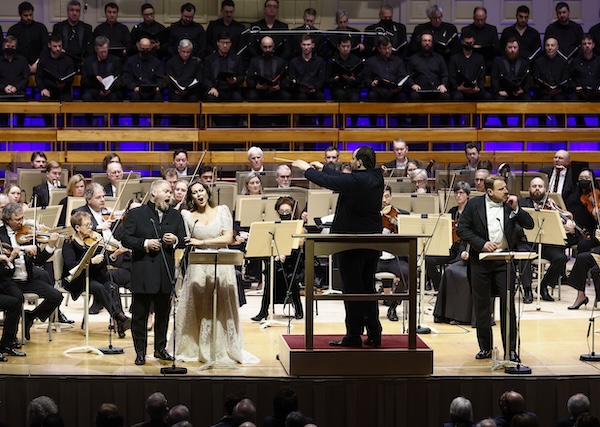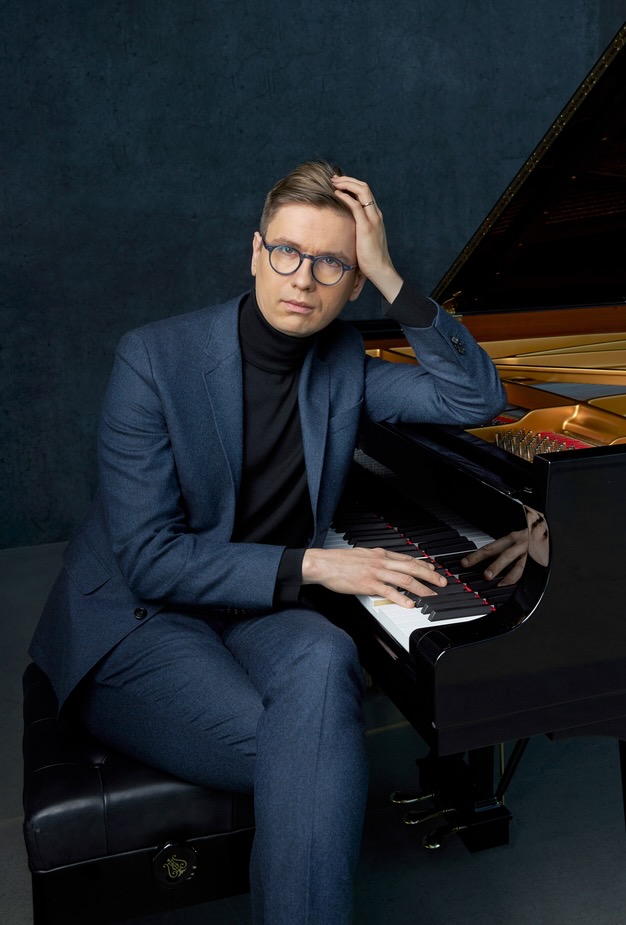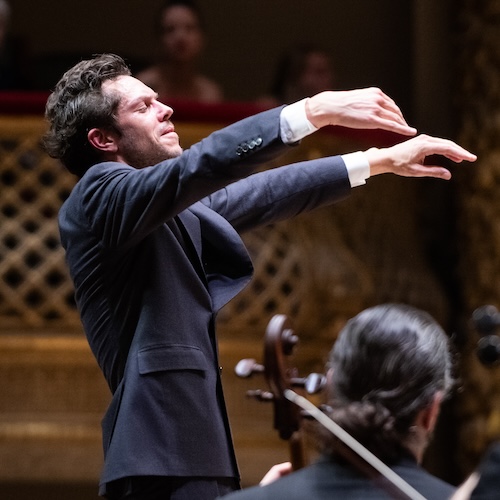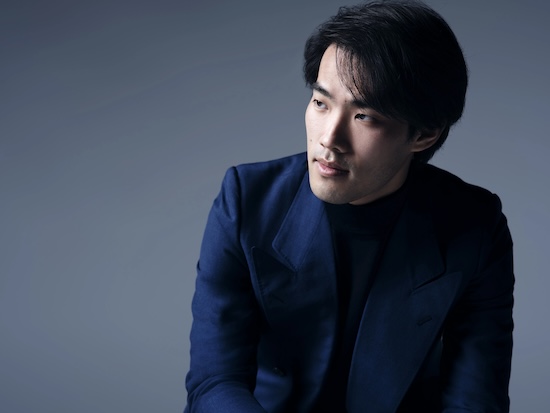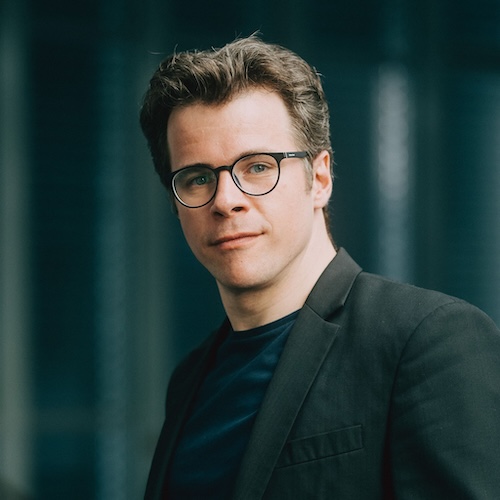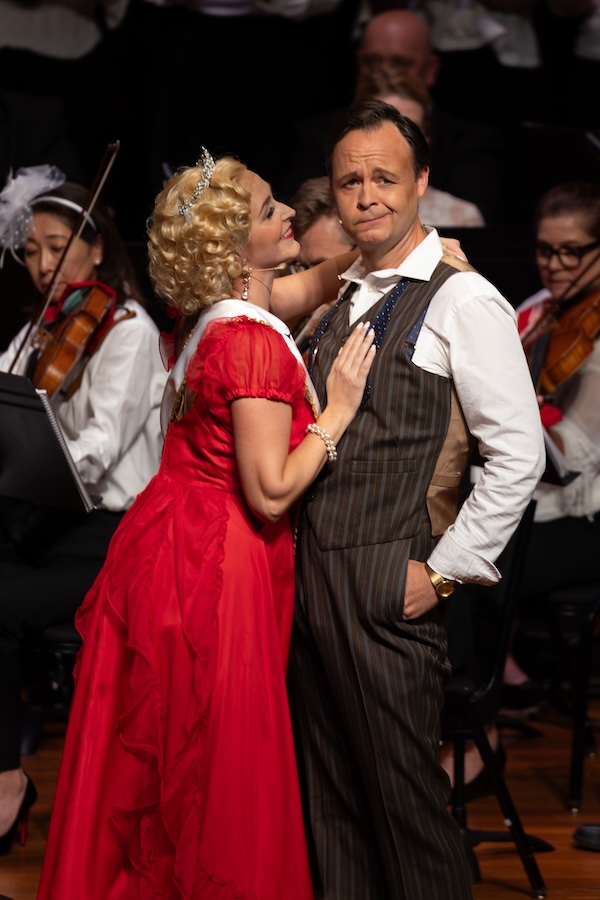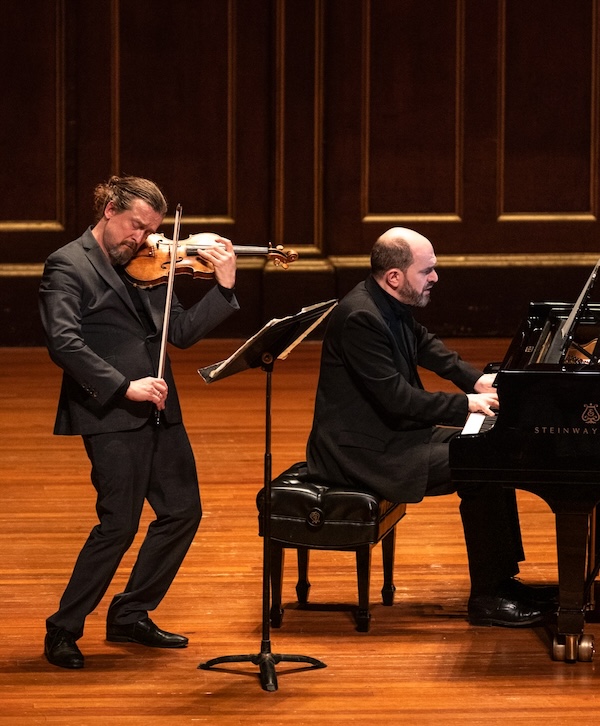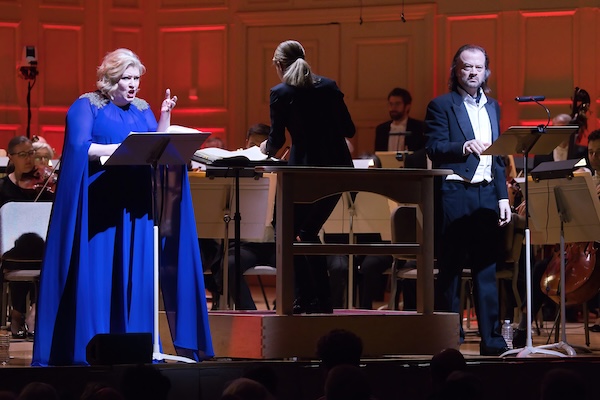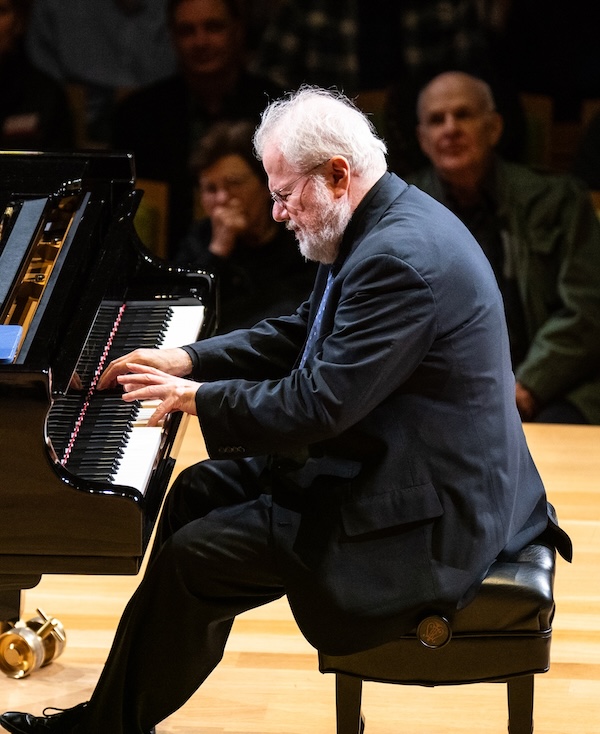Top Ten Performances of 2024
1. Shostakovich’s Lady Macbeth of Mtsensk. Andris Nelsons/Boston Symphony Orchestra
Andris Nelsons’ annual opera-in-concert weekends with the Boston Symphony Orchestra usually showcase the conductor at his best. This year’s surely did, with the culminating installment of the nine-year survey of Shostakovich’s symphonic output by Nelsons and the orchestra. Music of major historic interest—Stalin’s reaction to Lady Macbeth shaped the composer’s career as we know it—the score turned out to hold even more stylistic significance than anticipated. This deep and probing performance turned out to be the key to unlocking all of Shostakovich’s oeuvre.
2. Víkingur Ólafsson playing Bach
The Goldberg Variations stand as one of the canon’s three or four most imposing monuments. Yet there was nothing forbidding about the Icelandic pianist’s traversal of the set at Jordan Hall in February. Rather, Ólafsson’s reading blended absorbing sweep and organic logic, with every phrase and embellishment emerging with inviting freshness and a true sense of inevitability.
3. Beethoven’s Symphony No. 9. Raphaël Pichon/Handel & Haydn Society
Performances of the“Choral” Symphony are not exactly rare these days. Regardless, the Handel & Haydn Society’s March account of this Beethoven favorite stood out for its command of color and character, as well as the sense of occasion. Making his second appearance with the group, Raphaël Pichon led a reading of galvanizing rhythmic purpose that also overflowed with lyricism and style, especially across the finale’s involved and varied vocal episodes.
4. Bruce Liu playing Rameau, Chopin, Ravel, and Liszt
How can you tell a great pianist apart from a very good one? Listen to how they play Liszt. In March, Liu performed that composer’s Réminiscences de Don Juan de Mozart, a facile, 17-minute-long showpiece that, in his hands, was dispatched as a gripping, profoundly musical argument. That it transpired as such in the context of major works by Rameau, Chopin, and Ravel only added to the luster of the pianist’s musicianship.
5. Holst’s The Planets. Benjamin Zander/Boston Philharmonic Orchestra
Benjamin Zander is especially known for his Mahler, Bruckner, and Beethoven interpretations. This fall, however, the conductor has been reminding all and sundry just how good he is in the (non-Mahler) 20th-century canon, too. There was stirring Bartók in October and, in November, a terrific performance of Holst’s great orchestral suite. Though familiar fare, on this afternoon its seven movements were packed with the wonder and excitement of fresh discovery.
6. Music by Wagner, Brahms, and Schumann. Jakub Hrůša/Bamberger Symphoniker and Lukáš Vondráček
Bamberg is one of Bavaria’s most unprepossessing Medieval towns. But its orchestra ranks among the finest in Europe, especially when led by chief conductor Jakub Hrůša. The Bambergers’ April appearance—their first time on a Celebrity Series program since 1983—could hardly have been meatier or more Germano-centric. Yet their performances of orchestral favorites by Wagner (Tannhäuser Overture) and Brahms (Symphony No. 3) were outstandingly radiant.
In October, Odyssey Opera and the Boston Modern Orchestra Project teamed up for rare performances of two of George and Ira Gershwin’s three political satires at Jordan Hall. Running about 150 minutes, the pre-Election Day event made for a long evening, but one packed with great music and an surprising number of still-timely, 90-year-old gags.
8. Christian Tetzlaff & Kirill Gerstein playing Janáček, Kurtág, Bartók, Adès, and Brahms
This April appearance by two of the most fearless artists of the day more than lived up to its billing. Part of that owed to the duo’s absorbing, slightly offbeat program, part to the extraordinary rapport between the musicians. Taken together, it made for an afternoon of riveting and unsettlingly immediate music making.
9. Bartók’s Bluebeard’s Castle. Karina Canellakis/Boston Symphony Orchestra
Béla Bartók’s operatic adaptation of this nightmarish Hungarian folktale got the full treatment at Symphony Hall in February. Though on the whole strongly sung, the star of the show was the BSO which, under Canellakis’ expert direction, turned in a seething performance that reveled in the music’s intricate details but never lost sight of the big picture.
10. Emanuel Ax playing Schoenberg, Beethoven, and Schumann
In a year rich with canonic offerings, Ax’s survey of Beethoven’s two “quasi una fantasia” sonatas, Schumann’s ecstatic Fantasie, and a pair of short keyboard suites by Schoenberg might not merit much attention. But the common threads the pianist drew from these distinct works were fascinating to hear and experience. The latter composer often declared himself a musical descendant of Beethoven’s. On this afternoon, one could understand exactly why he made that case—and then go on to affirm that, indeed, Schoenberg was right.
Honorable Mentions
Scaled-down epics don’t always work out, but Boston Lyric Opera’s concert performance of Verdi’s Aida managed to impress for the right reasons—vocally, at least. Also compelling was the Takács Quartet’s account of Nokothuna Ngwenyama’s Flow, which managed to hold its own with heavyweights by Haydn and Beethoven.
This fall, the Boston Philharmonic Youth Orchestra’s pairing of Dvorak’s New World Symphony and Stravinsky’s The Rite of Spring made for an unexpectedly striking program. And pianist Alexander Crossett’s American Music Project recital in February proved noteworthy for its breadth and execution.
A Tale of Two Orchestras
Now in their eleventh season together, Andris Nelsons and the Boston Symphony Orchestra remain a conundrum. On the plus side, big undertakings, like Lady Macbeth and Mahler’s Eighth Symphony, generally drew out the pair’s collective best. So did collaborations with major solo artists. Significantly, the BSO’s music director remains an enthusiastic, non-dogmatic advocate for new music.
At the same time, it occasionally sounded this year like the conductor was learning repertoire on the fly. There was also a continued reluctance to dig deep, interpretively, in canonic efforts. Regular issues with the orchestra’s ensemble, too, highlighted an indiscipline that has crept into the group’s playing on his watch.
Those shortcomings appeared in stark relief during the November visit of the Berliner Philharmoniker and chief conductor Kirill Petrenko. Their illumination of Bruckner’s Symphony No. 5 was masterful. But it was the Philharmoniker’s total engagement with the music—nuanced and responsive, every player from the first desk to the last in each section, plus the man on the podium, totally, viscerally united in mining its riches—that left the strongest impression.
Granted, this is one of the great conductor-orchestra pairings of history. Even so, it made one long for the day when Boston’s flagship orchestra and its leader will consistently match their finest guests for passion, precision, and palpable commitment to the living spirit of whatever music’s before them.
The Year of the Non-Jubilee
For better or worse, the classical music industry loves anniversaries. This year offered several but, for the most part, Boston’s major institutions avoided them.
Arnold Schoenberg’s sesquicentennial only rated a passing nod from a couple of the city’s chamber ensembles—and none of its major orchestras. Ditto for Charles Ives’ 150th birthday: it fell to the Boston Philharmonic Youth Orchestra to mark the event with a performance of Three Places in New England (interestingly, the New England Philharmonic followed suit with the same work later the same day).
The most surprising omission was Anton Bruckner’s bicentennial. Though Andris Nelsons fancies himself a Bruckner conductor, the BSO didn’t play a note of Bruckner in ’24. Instead, it fell to a pair of BPOs to pick up the slack. In April, the Boston Philharmonic closed its season with an affecting account of the Ninth. Then, of course, the Berliner Philharmoniker brought the Fifth to town and, in the process, threw a bash worthy of a 200th birthday.
Local Premieres
2024’s new music highlights included the Isidore String Quartet’s assayal of Billy Childs’ “Awakenings” as well as Elena Ruehr’s witty Broadway Boogie Woogie. Anna Thorvaldsdottir was well-represented with performances of Spectra and Archora. Equally welcome was the BSO’s belated reprise of Michael Gandolfi’s stirring organ concerto, Ascending Light, in October.
On the other hand, BSO Composer Chair Carlos Simon’s Wake Up! Concerto for Orchestra was explosive—but also digressive and short on strong thematic ideas. Sven-David Sandström’s stab at resetting the libretto from Handel’s Messiah maundered. Likewise dispiriting was Elena Langer’s adaptation of Edward Lear’s The Dong With the Luminous Nose.
Though local wunderkind Matthew Aucoin’s Eurydice had more than a few things going for it, the opera’s Boston premiere raised more questions than they answered, thanks to Boston Lyric Opera’s erratic staging and the score’s sometimes derivative nature. Dominick Argento’s The Voyage of Edgar Allan Poe featured no shortage of inventive music, but its first local performance from Odyssey Opera struggled to overcome Charles M. Nolte’s convoluted libretto. The flaws of the last were unintentionally enhanced by the fact that virtually none of the words uttered by the cast emerged intelligibly in the blacked-out, supertitle-free theater.
In memoriam
“The song is ended,” Irving Berlin wrote in his eponymous 1927 hit, “but the melody lingers on.”
The last is certainly true for Seiji Ozawa, who died in February at 88. While his 29-year tenure as music director of the BSO had its ups and downs, no conductor save Koussevitzky devoted more time or energy to the orchestra. More than that, over a very long career Ozawa was, like his one-time mentor Leonard Bernstein, an exceptional ambassador for the art form.
During Ozawa’s appointment, the conversation around classical music in Boston was shaped to a considerable degree by Richard Dyer, who until 2006 was the chief critic of The Boston Globe. A writer of enormous intelligence and influence—the composer Ned Rorem once introduced him as the man who “runs Boston”—Dyer passed away unexpectedly in September at 82.
Another towering member of the old guard was Burton Fine, the BSO’s former principal violist, who died in November at 94. An artist of warmth and refinement, Fine’s playing can be heard on any number of recordings, including the early ones of the Boston Symphony Chamber Players. Before his death, Fine was the last founding member of that collective still with us. Now he, Joseph Silverstein, Jules Eskin, Doriot Anthony Dwyer, and the rest of those legends belong to the ages.
Posted in Articles
